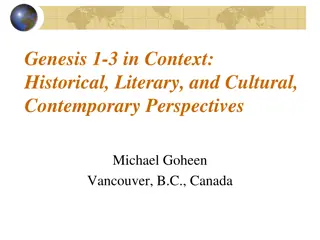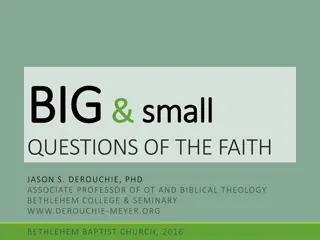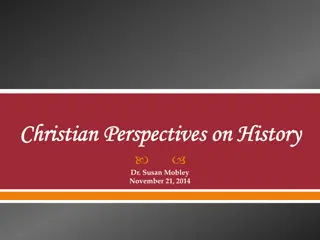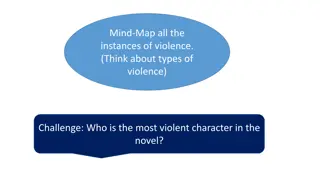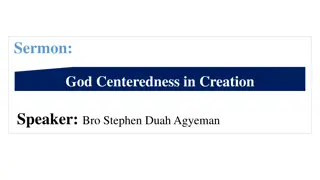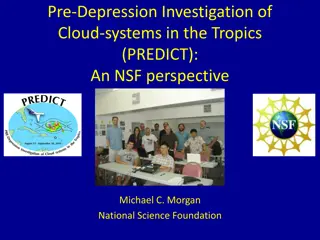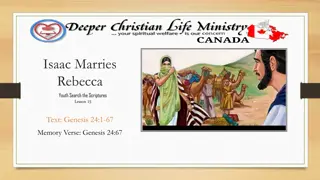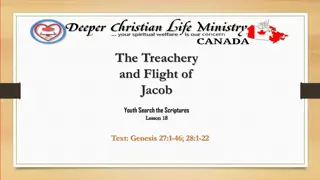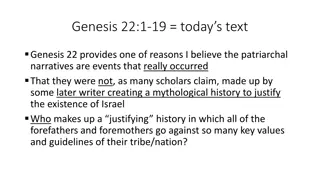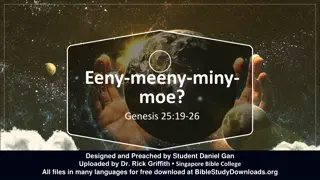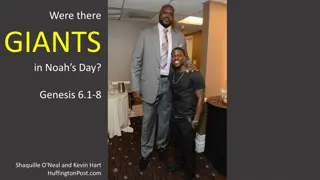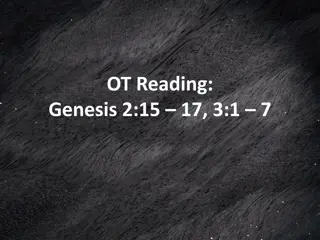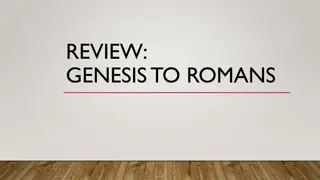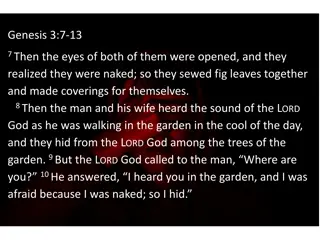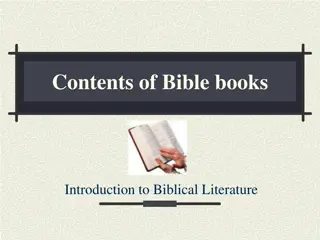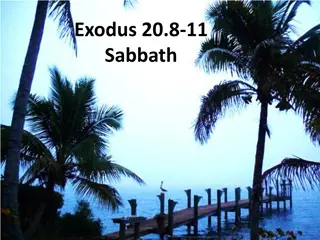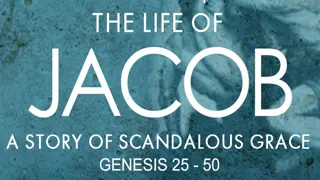The Historicity of Genesis: Why It Matters" (39 characters)
Central Alabama Preachers and Bible Teachers Workshop focuses on the historicity of Genesis and its significance in the face of modern narratives. Discussing myths, biblical truths, and criteria for historical accuracy in Genesis 1-11. Featuring Dr. Ralph Gilmore and viewpoints from Trinity University and Harvard. Explore the clash between cultural evolution theories and biblical accounts, challenging the audience to reconcile faith and history. (327 characters)
Uploaded on Mar 07, 2025 | 1 Views
Download Presentation

Please find below an Image/Link to download the presentation.
The content on the website is provided AS IS for your information and personal use only. It may not be sold, licensed, or shared on other websites without obtaining consent from the author.If you encounter any issues during the download, it is possible that the publisher has removed the file from their server.
You are allowed to download the files provided on this website for personal or commercial use, subject to the condition that they are used lawfully. All files are the property of their respective owners.
The content on the website is provided AS IS for your information and personal use only. It may not be sold, licensed, or shared on other websites without obtaining consent from the author.
E N D
Presentation Transcript
The Historicity of GenesisWhy It Matters Central Alabama Preachers and Bible Teachers Workshop Decatur 10-11-21 Dr. Ralph Gilmore 1
My Outline 1. My Basic Position 2. James Hoffmeier s Case (from Trinity University) affirming the historicity of Jesus 3. Pete Enns Response (from Harvard) that Genesis should not be read that way. 4. My Counter-response for the Historicity of Genesis 2
The Problem Defined The early chapters of Genesis contradict ancient history as portrayed in public schools, television, and movies. For example, our culture insists humans evolved from ape-like creatures, while Genesis says we were made in God s image. Culture says the earth formed over eons, but Genesis 1 says it took God just six days. Is it possible to believe both the Bible and evolution s history? icr.org 3
The Nature of Myths Heathen religions abound in myths. The Greek myth of Pandora's box explains evil in the world as the result of a woman's opening a box contrary to the instruction of the gods. The Babylonian myth Enuma Elish explains creation from the killing and dividing of a great monster, Tiamat. Scripture speaks of myths. In the Greek of the New Testament, Scripture speaks of myths explicitly: the Greek word is muthos, "myth." 4
But Scripture denies that the biblical message is based on, or derived from, myths: "For we have not followed cunningly devised fables (Greek: muthos), when we made known unto you the power and coming of our Lord Jesus Christ, but were eyewitnesses of his majesty" (2 Pet. 1:16). It warns the saints, particularly ministers, against myths: "Neither give heed to fables (Greek: muthos)" (1 Tim. 1:4). Scripture prophesies that in the last days professing Christians will turn from the truth to myths: "And they shall turn away their ears from the truth, and shall be turned unto myths (Greek: muthos) (2 Tim. 4:4). Note the clear distinction between truth (aletheia) and myth. 5
Gen 1-11 meets the following criteria for historicity after application of the following: Carefully observe the text Context is key Clarity of Scripture Compare Scripture with Scripture Classification of the text Church s historical view --Caffey 6
My Early Intro as to why Gen 1 My Early Intro as to why Gen 1- -11 is Historical 11 is Historical (atg) 1. If it is poetic, or mythic, why does it agree in tone and voice with the rest of Genesis? 2. If we treat Gen 1-11 is treated this way, what about other Scriptures (like Psalm 78). 3. If not historical, what do you do with the Jesus problem ? (Matt 19:4-5; Mk 10:6-7). 4. What if the scientific case is not as strong as you think? (more from me later) 7
Zondervans recent volume in their popular Counterpoints series concerns the historicity of Genesis 1-11, Genesis: History, Fiction, or Neither?: Three Views on the Bible s Earliest Chapters (2015). The three well-known contributors are James Hoffmeier (Trinity International University), Kent Sparks (Eastern University), and Gordan Wenham (Trinity College and University of Gloucestershire).The editor, Charles Halton, summarizes the differences between them: 8
Professor Hoffmeier Hoffmeier believes that theology begins from the foundational understanding that the events recorded in Gen 1-11 really happened and that the Israelite scribes did not borrow from the Mesopotamian or Egyptian myths but were writing in opposition to them. The Israelites corrected the misunderstandings and mythologies of their day with an authoritative and historically accurate portrait. 9
Professor Wenham a core of historical reality in Gen 1-11 but that the telling we have is like an impressionist painting we can only make out vague outlines of what really took place. Wenham believes that there is 10
Professor Sparks of the Bible employed standard forms of ancient historiography whose primary intent was not to precisely relay events that occurred in space and time. These scribes emplotted a theological story that reveals deep insights into the character and nature of God. (pp. 155- 56). Sparks thinks that the writers 11
Professor Peter Enns from Harvard is seeking to strengthen his case by trying to improve on the case that Sparks and Wenham give for the non-historicity of Genesis. 12
Professor Hoffmeiers 7 Points for Historicity 1. Genesis 1-11 sets the theological stage for the rest of the Bible, and so, if Genesis 1-11 cannot be trusted to deliver to us historical truth, the entire theological structure of the entire theological structure of the Bible falls apart Bible falls apart. Hence, the historical nature of Genesis 1-11 must be protected at all costs. 13
Professor Hoffmeiers 7 Points for Historicity 2. Denial of the historical nature of Genesis 1- 11 is simply the product of atheistic thinking of Enlightenment rationalism Enlightenment rationalism, which is fundamentally in rebellion against God. Hence, biblical criticism is only so-called critical' because it is rooted in the deep bias of anti-biblical thinking. 14
Professor Hoffmeiers 7 Points for Historicity 3. Perhaps the most damaging aspect of Enlightenment thinking is the bewilderingly speculative preoccupation to distill sources behind Genesis. Since Wellhausen s four four- -source theory source theory (JEDP) has been rejected by even European scholars and as such is DOA we evangelicals who reject (and have always rejected) source criticism are not only vindicated but are actually show ourselves to be more rigorously academic than those who blindly hold to older critical orthodoxies. Wellhausen s 15
Professor Hoffmeiers 7 Points for Historicity 4. Further, continuing to give quarter to the particularly odious, speculative theory of sources pits one against the entire Jewish and Christian pre Christian pre- -critical tradition critical tradition that has accepted Moses as the fundamental author of the Pentateuch. Jewish and 16
Professor Hoffmeiers 7 Points for Historicity 5. Since Genesis 1-11 refers to people with lineages and real geographic locations, it is clearly intended to be read as relaying historical space/time events, and so we must take this historical intention take this historical intention seriously seriously which means accept that this historical intention produced a historically accurate text. 17
Professor Hoffmeiers 7 Points for Historicity 6. Sparks puts science over the Bible, and this inexorably leads to a denial of the resurrection of denial of the resurrection of Christ Christ, which is also impossible on scientific grounds. 18
Professor Hoffmeiers 7 Points for Historicity 7. Genesis 1-11 cannot be influenced by Mesopotamian myth because it is a polemic polemic against Mesopotamian myth Mesopotamian myth. 19
Peter Enns Response to Hoffmeiers 7 Reasons 1. The presence of this theological structure does not settle the vexing historical problems of Genesis 1-11, and to think that it does is a common evangelical and fundamentalist assertion. 20
Peter Enns Response to Hoffmeiers 7 Reasons 2. This sort of rhetoric (alleging Enlightenment rationalistic influence) is not designed to converse but to gain a theological upper hand by determining the playing field and rules of engagement. It has worn out its welcome and has no place in scholarly engagement. 21
Peter Enns Response to Hoffmeiers 7 Reasons 3. Let me simply say that source criticism is most certainly not dead, though most all have moved beyond Wellhausen, including neo-documentarians like Joel Baden and Jeffrey Stackert. P and D are not seriously questioned among biblical scholars. The origins of Israel s ancient narratives J and E are. That is a great discussion to have. But the we know Wellhausen was wrong so now we can retreat back to Mosaic authorship rhetoric is at best misleading because it is grounded in a description of Pentateuchal scholarship that is absolutely wrong. 22
Peter Enns Response to Hoffmeiers 7 Reasons 4. Hoffmeier seems to think that debunking Wellhausen not only neuters any source analysis of the Pentateuch but de facto puts Mosaic authorship back in its rightful place as the traditional, and problem-free explanation for Pentateuchal origins. But Mosaic authorship, regardless of how the matter is framed, cannot be given a free pass. Its problems, which have been observed since long before the advent of Enlightenment rationalism, do not simply disappear. 23
Peter Enns Response to Hoffmeiers 7 Reasons 5. Sparks addresses this point, when he states what appears to me to be obvious: intending to write history doesn t mean you pulled it off, and biblical authors do not get a free pass on historical accuracy, especially without addressing the type of history writing we can expect from ancient Israelite/Jewish authors. 24
Peter Enns Response to Hoffmeiers 7 Reasons 6. I can say with full confidence that Sparks has not made some thoughtless presuppositional commitment to Wissenschaft ber alles (i.e. science triumphs over all), as Hoffmeier rather indelicately caricatures him (p. 142). To say that the study of human history including ANE religious texts renders suspect the historicity of Gen 1-11 is not to say that science triumphs over ALL but that science informs our thinking on issues that are actually open to scientific investigation. 25
Peter Enns Response to Hoffmeiers 7 Reasons 7. A key element in Hoffmeier s argument is that Genesis 1-11 is a polemic against Mesopotamian myth and therefore independent of it. But the fact that Genesis 1-11 is certainly polemical does not in any way suggest that far older Mesopotamian myth does not form the cultural back drop for Genesis 1-11. The polemic only works because it embraces ancient assumptions about the nature of the cosmos. 26
My Counter-response for the Historicity of Genesis 1. It is true that the presence of theological structure does not prove that Genesis is historical but there are other factors. For instance: 27
The New Testament treats Genesis 111 as historical narrative. At least 25 New Testament passages refer directly to the early chapters of Genesis, and they are always treated as real history. Genesis 1 and 2 were cited by Jesus in response to a question about divorce (Matthew 19:4 6; Mark 10:6 9). Paulreferenced Genesis 2 3 in Romans 5:12 19; 1 Corinthians 15:20 22, 45 47; 2 Corinthians 11:3; and 1 Timothy 2:13 14. The death of Abel recorded in Genesis 4 is mentioned by Jesus in Luke 11:51. 28
The Flood (Genesis 69) is confirmed as historical by Jesus (Matthew 24:37 39) and Peter (2 Peter 2:4 9, 3:6), and in Luke 17:26 29, Jesus mentioned the Flood in the same context as he did the account of Lot and Sodom (Genesis 19). Finally, in Luke s genealogy of Christ, he includes 20 names found in the genealogies of Genesis 5 and 11 (Luke 3:34 38). --Tim Chaffey, answersingenesis.org 29
2. Regarding the influence of enlightenment rationalism on critical theory, it has indeed been immense. The anti-supernatural bias that plagues much critical theory makes it difficult to interpret Gen 1-11 because of how miraculously God interacted with the creation of earth, the creation of man and woman, the flood, the tower of Babel, etc. 30
In response, Dr. Catherine Murphy from Santa Clara U. raises this point: More "damaging" to the Documentary Hypothesis in general is the concern raised since the 1970s that picking apart the sources of Torah is a speculative enterprise akin to dissecting an animal in a biology lab. You learn alot, and it has its place, but at the end of the day the living frog in his ecosystem may be of greater interest, thus the books of Torah in their final form as literary works, or their role within the complete biblical canon, or their function as persuasive stories within the living faith community, may be of greater interest. --scu.edu 31
Besides, if one can establish Mosaic Besides, if one can establish Mosaic authorship beyond reasonable doubt, authorship beyond reasonable doubt, all this documentary hypothesis stuff all this documentary hypothesis stuff goes away. This we will do later. goes away. This we will do later. 32
3. Third, Enns claims that Hoffmeier overstated his case about the academic death of JEDP, Enns claims that D ( Deuteronomist, the author of Deuteronomy ) and P (the priestly author of Leviticus) are still very much alive. 33
Regarding whether source criticism has any value to conservative scholarship, I believe it does but only in those areas where authorship has not be determined by the internal and external evidence (like some of the Psalms, some of the Proverbs, etc.). It has some value even when authorship is unquestioned. 34
4. Now for the big oneMosaic Authorship. Regarding the authorship of the Penteteuch, I present the following evidence: 35
Support for Mosaic Authorship: Support for Mosaic Authorship: From the Penteteuch itself: Throughout the Pentateuch it becomes clear that Moses is recording what happens. Exodus 24:4 states that "Moses then wrote down everything the LORD had said" and that shortly thereafter he took the "Book of the Covenant and read it to the people" (Ex 24:7). Moses also wrote down the Ten Commandments (Ex 24:27-28). Other passages shed light on the fact that Moses kept record of what was going on (Ex 17:14; Num 33:2), and there are clear references that Moses was the author of Deuteronomy (Deut 31:9, 19, 22, 24). Less direct references can be found in Ex 25:16, 21-22; Deut 28:58; 29:20, 21, 27, 29; 20:10, 11. 36
Support for Mosaic Authorship: Support for Mosaic Authorship: From the Rest of Scripture: The Bible refers to Moses as the authority behind the books of the Law. The books are referred to as the "Book of Moses" (5 times [1]), the "Law of Moses" (22 times [2]), the "Book of the Law of Moses" (4 times [3]), the "Word of the Lord by Moses" (1 Time [4]), and the contents of the books are attributed to Moses over 32 times (cf. 2 K. 21:8, 1 Ch. 15:15, 1 Ch. 22:13, 2 Ch 24:6, 2 Ch. 33:8, 2 Ch. 34:14, Ne. 1:8, Ne. 8:14, Ne. 10:29, Mal. 4:4, Matt. 8:4, Matt. 19:8, Matt. 22:14, Mark 1:44, Mark 7:10, Mark 10:4, Luke 5:14, Luke 20:37, Luke 24:27, John 1:45, John 5:46, John 7:19, John 7:22, John 8:5, Acts 3:22, Acts 15:21, Acts 26:22, Rom. 10:5, Rom. 10:19, 2 Cor. 3:15, Heb. 9:19). 37
Support for Mosaic Authorship: Support for Mosaic Authorship: Paul, and Philip: Paul (Rom. 10:5), and Philip (John 1:45) attest to Moses writing. 38
Support for Mosaic Authorship: Support for Mosaic Authorship: From Jewish and early Christian support The Jewish Talmud refers to the first five books of the Bible as the "Book of Moses." Furthermore, the Mishna and the early Jewish historian Josephus both accepted the Mosaic authorship of the Pentateuch (Arnold and Beyer, p. 69). 39
Support for Mosaic Authorship: Support for Mosaic Authorship: From Jesus: Jesus divided the Old Testament into three sections in Luke 24:27, 44: Moses, the Prophets, and the Psalms. Also, in Mark 10:4-8, Jesus quoted Gen. 2:24 as coming from Moses. In Mark 7:10, Jesus quoted the Ten Commandments as coming from Moses. In Mark 10:3 Jesus refers to Deut. 24:1f as being from Moses, and in Matt. 8:4 Jesus quoted Lev. 14 as coming from Moses. --theopedia.com (M.A.P.) 40
5. Regarding Genesis referral to historical places and people, Enns says we should not take the apparent appearance of historical intent of the narrator(s) too seriously. He believes that the type of history writing we can expect from ancient Israelite/ Jewish authors needs to be considered. 41
5. In response to this critique, I wonder what more could be done to establish the historical intent of the author than what has been done? The same anti-supernatural bias raises its head with this objection. 42
6. Regarding alleged scientism (i.e., the belief that Science has any and all definite answers ), good science recognizes its limits. 43
7. Regarding whether Genesis is a polemic against the Mesopotamian legends of its day as Hoffmeier suggests, perhaps that claim is a bit too strong. Genesis certainly is antithetical in major points against Babylonian creation myths. 44
Key Differences in Enuma Elish and Genesis 1-3 1. The role of the human being in Enuma Elish and what is the role of the human being in Genesis 1-11 are remarkably different. In Enuma Elish the creation of human beings is an afterthought and their purpose is to serve as an accouterment to the lifestyle of the gods. The creation of Genesis puts human beings in the image of God. It is not by accident when the Psalmist muses, You made him only slightly less than God (Psalm 8:5). 45
Key Differences in Enuma Elish and Genesis 1-3 2. Genesis has no lesser gods as in Babylonian myths. 46
Key Differences in Enuma Elish and Genesis 1-3 3. Genesis is completely silent about the great combat myth that was indelibly linked with the reputation of Marduk, god of cities. 47
Key Differences in Enuma Elish and Genesis 1-3 4. Genesis puts the spotlight on the value of the human being, but not Enuma elish. 48
Key Differences in Enuma Elish and Genesis 1-3 5. Genesis is consistent with a well-developed monotheism. Babylonian myths are pagan. 49
Key Differences in Enuma Elish and Genesis 1-3 6. The theology of Enuma Elish pales in detail and significance from that of Genesis. (Source: https://archive.org/stream/RabbaGenesis/midrashrabbahgen027557mbp_djvu.txt ). 50
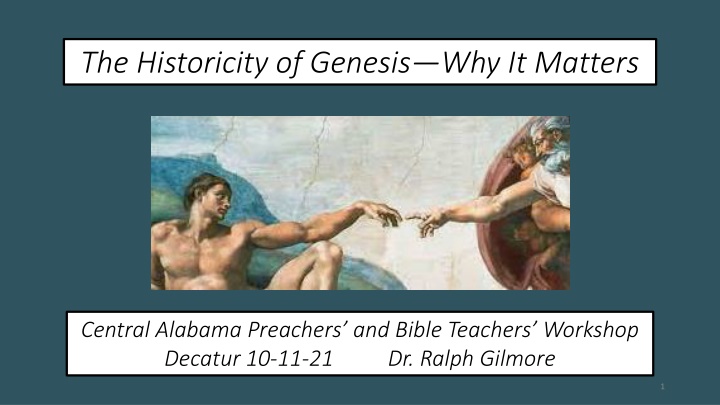

![❤[PDF]⚡ Escaping from Eden: Does Genesis Teach that the Human Race was Created](/thumb/21697/pdf-escaping-from-eden-does-genesis-teach-that-the-human-race-was-created.jpg)
